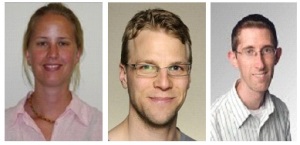Aug 27 2013
IQC postdoctoral fellows Anne Broadbent and Gus Gutoski, along with IQC alumnus Douglas Stebila, have been accepted to present their paper Quantum one-time programs at the prestigious cryptology conference CRYPTO 2013 at the University of California Santa Barbara on August 18-22.
Cryptology is the study of coding patterns and histories, which includes cryptography (making codes) and cryptanalysis (breaking codes).
 From left to right: Anne Broadbent, Gus Gutoski, and Douglas Stebila
From left to right: Anne Broadbent, Gus Gutoski, and Douglas Stebila
The paper shows that it is possible to build secure one-time quantum programs, even if used as part of a larger computer system that involves cryptography. A one-time program can be thought of as a hypothetical computational device which allows a user to run a program on an input of his choosing a single time. In other words, it takes an input such as an algorithm from the user, runs a program and then self-destructs, forever securing the information. These programs are made out of extremely simple classical devices called one-time memory devices (hypothetical hardware devices used to show the existence of classical one-time programs), together with quantum operation.
Broadbent, Gutoski and Stebila have been studying together since their undergraduate days in mathematics at the University of Waterloo. Broadbent, a CIFAR global scholar, has accepted a position as Assistant Professor in the Department of Mathematics and Statistics at the University of Ottawa. Gutoski completed his full-time postdoctoral fellowship at IQC and now shares his time between the Perimeter Institute of Theoretical Physics and IQC. Stebila is now a Senior Lecturer at the Queensland University of Technology in Australia.